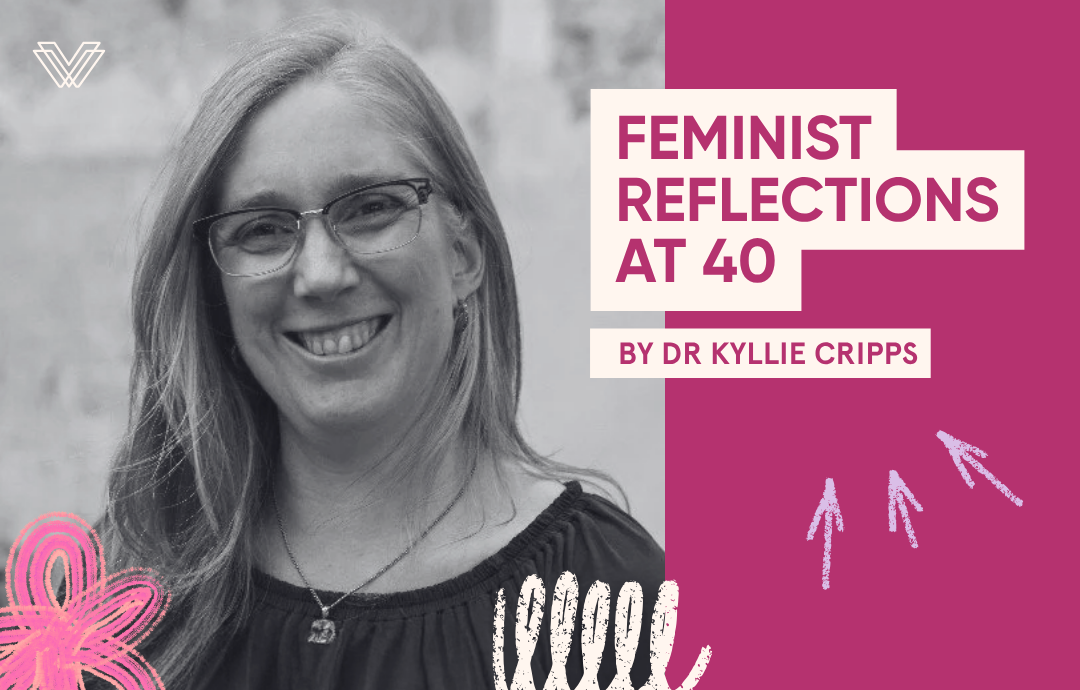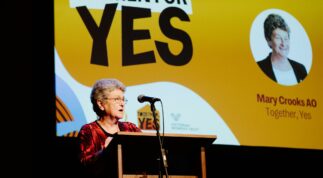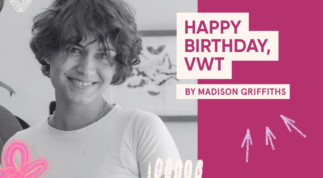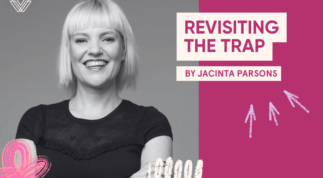Community, Collaboration, and Change
Turning forty is a milestone—not just for the Victorian Women’s Trust (VWT), but as an invitation to reflect deeply on over four decades of feminist organising. For VWT, this anniversary marks years spent building an infrastructure for collective action: women governing, leading, and remaining accountable to their community. From its beginning in 1985 with a $1 million endowment from the Victorian Government, the Trust has nurtured grassroots efforts, funded bold advocacy, and created space for feminist ideas to flourish and spark change.
VWT’s story is woven into a broader tapestry of feminist ambition: women reaching across backgrounds, cultures, and generations, achieving transformative outcomes together. True progress, though, emerges when this work is grounded in solidarity with First Nations women—deepening the possibilities for justice and enduring change.
Collaboration with First Nations Women and Girls
No feminist organisation in Australia holds credibility without grappling with colonisation and its impacts. Aboriginal and Torres Strait Islander women face systematic inequities compounded by gendered violence and economic exclusion. VWT’s enduring partnership with Koorie Women Mean Business (KWMB), which began in the early 1990s, exemplifies authentic collaboration. KWMB has championed Aboriginal women’s leadership and economic strength, expanding programs and hosting forums where Indigenous voices influence both policy and practice.
A powerful testament to this impact is the “Together, Yes” campaign, launched in 2023. By centring Indigenous leadership, this endeavour mobilised over 3,000 hosts nationwide, drawing thousands into kitchen table conversations about constitutional reform and the First Nations Voice to Parliament.
“In 1967 we were counted, in 2017 we seek to be heard. We leave base camp and start our trek across this vast country. We invite you to walk with us in a movement of the Australian people for a better future.”
– Uluru Statement from the Heart, May 2017
This invitation was issued to support an Australian nation to keep growing, as Megan Davis reminded VWT in this initiative:
“If not now, when? When our voice is protected in the Constitution from the vagaries of ideology and party politics, we will be heard, and we can have a fair and truthful relationship with the people of Australia”
This captured the spirit behind movements like ‘Together, Yes” where meaningful change through public dialogue, that was rooted in truth-telling, and a commitment to building a fairer, more honest future for all – enabled more respectful and informed conversations.
VWT and KWMB’s partnership influence is also visible in many co-hosted forums—most recently in 2022 and 2023—with First Nations women shaping public conversation, forging networks, and advocating for meaningful policy reform. Pathways for Aboriginal economic self-determination have expanded through enterprise workshops and networking opportunities, turning workshops into stepping stones for women to lead in their own communities and businesses.
Violence prevention remains central to this partnership as well. Initiatives like the Imaroo zone support healing and strengthen cultural connections among Indigenous men, fostering alliances for safer communities. Events such as the 2012 masterclass with Jackson Katz underscore the commitment to empowering men as allies in confronting colonial masculinities—and making lasting change.
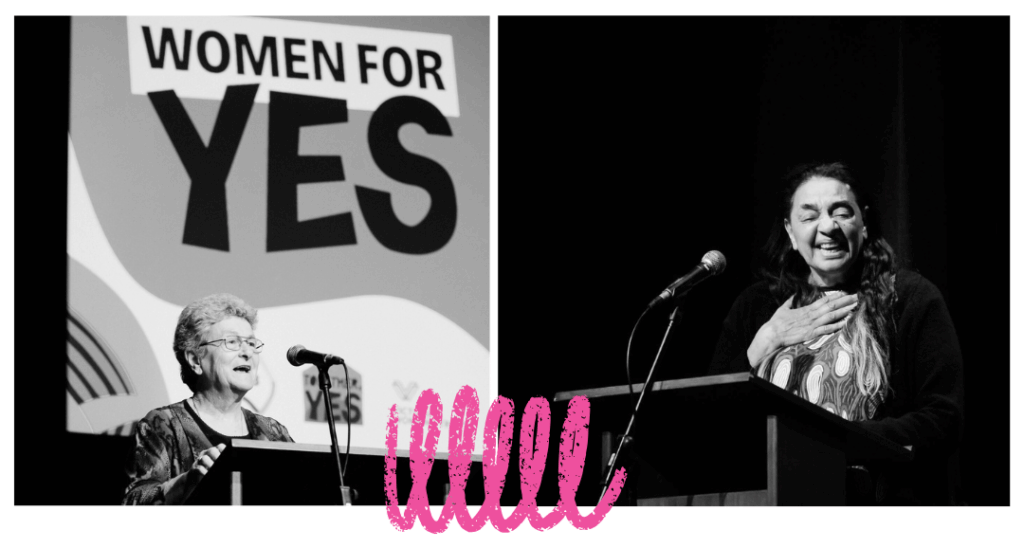
Image left: Former Executive Director, Mary Crooks AO, speaking at the Women for Yes event in 2023.
Image right: Koorie Women Mean Business Executive Director Leanne Miller AM speaking at the Women for Yes event in 2023. Images by Breeana Dunbar.
Reshaping Leadership: The Power of Partnership and Contribution
These collaborations demonstrate a reimagined idea of leadership and authority – one that emerges through authentic partnership and shared contributions. Madam Speaker, Australia’s first digital archive of women’s speeches provides a powerful contemporary example of this. Created as a partnership between VWT and Your Creative, Madam Speaker intentionally disrupts conventional narratives by addressing the chronic underrepresentation of women’s voices and authority on the public record. The archive not only collects and preserves speeches from women and gender diverse people across politics, arts, disability advocacy and so much more, but also invites public participation: anyone can nominate or submit a significant speech, helping to grow a living, community-built repository. By 2026, the initiative aims for an archive of 800 speeches, transforming authority into something, lived, shared and continually formed by collective contribution.
As Mary Crooks AO, Executive Director of the Victorian Women’s Trust, explains: “It’s as though it is mainly men who exercise authority and thought leadership. With Madam Speaker we ask, why is this so? And what can we do to challenge and erode this bias?” The answer lies in building tools and platforms—like Madam Speaker—that centre diverse lived experience and create open, participatory examples of leadership for current and future generations.
Global Conversations Spark Local Movement
VWT continually weaves in international inspiration, strengthening networks for local justice. Hosting Tarana Burke, founder of MeToo, who visited in 2019—an encounter that linked global movements directly with VWT’s local work and created an essential mirror for Australian feminists, especially First Nations women who bear the enduring burdens of gendered and racial violence. Burke’s presence amplified the importance of recognition, solidarity, and the global lineage of resistance; her dialogue with local leaders embedded feminist activism within both local and worldwide struggle.
Such exchanges revealed the strength of interconnected movements, challenging Australian feminism to more honestly reckon with race and power. For First Nations women, Burke’s message resonated: survival is only the beginning; the journey continues toward justice and healing.
Engaging Men Toward Safer Futures
Building safer communities for women and girls means engaging men as partners. VWT’s collaborations with global figures like Jackson Katz and locally led initiatives like the Imaroo zone stress that positive change requires men’s engagement and leadership renewal. Katz’s 2024 Melbourne event with Mary Crooks AO exemplified feminist ideas as opportunities for healthier masculinities—not enemies of men. Recovery from colonial legacies must be led by Indigenous men themselves, with feminist organisations listening, supporting, and sharing the platform.
A Tapestry of Feminist Collaboration
VWT’s history is one of alliances—through grants, public campaigns like Women for Yes, and broad support for migrant, rural, and LGBTQI+ networks, as well as innovative projects in arts, health, and justice. These collaborations are not transactional, but about weaving strong, resilient connections.
Looking Forward: The Next Forty Years
The road ahead remains challenging: violence persists, inequality widens, and climate change looms. For First Nations women, these injustices intensify through systemic racism and inherited trauma. VWT’s history demonstrates that meaningful progress is not solitary but emerges through networks of solidarity and courageous partnership. The next forty years demand deeper decolonial practice—embedding this in governance, advocacy, and funding, and making Indigenous women’s leadership a central priority. Building stronger relationships with men’s movements, particularly those led by First Nations people, is essential, as is growing ever-broader coalitions across the intersections of race, class, sexuality, and generation.
Closing Reflection: Continuing to Weave
In one of VWT’s landmark public initiatives of the late 1990s, the Purple Sage Project, Gunggari Elder Ethel Munn posed a challenge that resonates still:
“If Australians are to live together and share the country, there is the need for a ‘miracle of ears’! We need people to listen and actually hear what is being said.”
As the Trust looks ahead, these words serve as an enduring guide—reminding us that change only becomes possible when we truly listen to each other, centring First Nations voices and wisdom at every step.
Let us honour these decades
as a tapestry woven
from struggle, resilience, and hope.
Yet the weave is never finished—
each strand carries the stories
of those before and the hopes
of those yet to come.
Forty years have bound
threads of struggle and strength,
a fabric of change
stitched by many hands.
The next threads are waiting.
They ask us to listen,
to place First Nations women
at the centre of the loom,
to knot our futures
to include their leadership.
And when the fabric is tested,
as it surely will be,
may we remember
its strength is not in one fibre alone,
but in the way every thread holds
when pulled from every side.
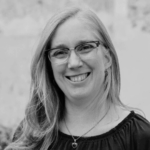 Professor Kyllie Cripps is a Palawa woman and one of Australia’s leading experts on violence against First Nations women. Her research has redefined how Indigenous family violence, sexual assault, and child abuse are understood—centring Indigenous perspectives, identifying systemic drivers of harm, and shaping practical responses through major national studies. As a Chief Investigator in the ARC Centre of Excellence for the Elimination of Violence Against Women, Kyllie leads interdisciplinary, community-engaged research focused on transforming policy and service delivery. Her work critically examines justice system responses—including policing and sentencing—while also addressing the intersecting roles of housing, child protection, and health. Kyllie is deeply committed to creating safe spaces for truth-telling, working in partnership with communities to identify solutions, and building networks of care and advocacy. Her approach is grounded in cultural strength, accountability, and a vision for safer futures for Indigenous women and children.
Professor Kyllie Cripps is a Palawa woman and one of Australia’s leading experts on violence against First Nations women. Her research has redefined how Indigenous family violence, sexual assault, and child abuse are understood—centring Indigenous perspectives, identifying systemic drivers of harm, and shaping practical responses through major national studies. As a Chief Investigator in the ARC Centre of Excellence for the Elimination of Violence Against Women, Kyllie leads interdisciplinary, community-engaged research focused on transforming policy and service delivery. Her work critically examines justice system responses—including policing and sentencing—while also addressing the intersecting roles of housing, child protection, and health. Kyllie is deeply committed to creating safe spaces for truth-telling, working in partnership with communities to identify solutions, and building networks of care and advocacy. Her approach is grounded in cultural strength, accountability, and a vision for safer futures for Indigenous women and children.
